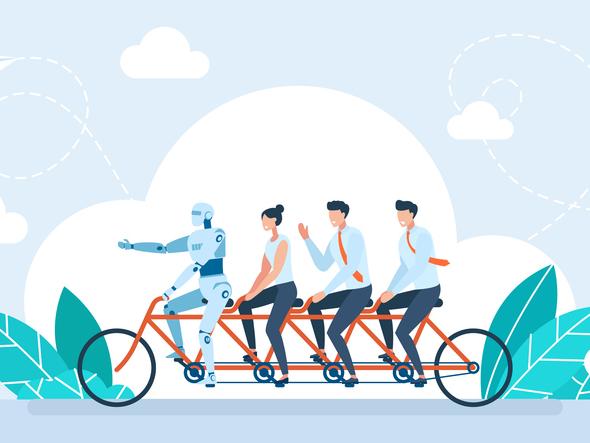
Could AI manage your research project?

The dawning of the artificial intelligence era could have a transformative impact on academic research. AI can significantly increase productivity by taking over mundane and routinised research tasks in areas such as data processing or analysis. With AI capabilities improving at a rapid rate, it can also now support researchers in more complex and creative aspects of their work, identifying research questions, reviewing prior literature and solving scientific problems.
But the next frontier is using AI as a manager of people who perform research. Algorithmic management may be a gamechanger for the organisation and execution of research projects.
- Resource collection: What innovation needs to thrive in higher education
- The GenAI awakening: navigating the new frontier of research support
- Three ways to leverage ChatGPT and other generative AI in research
Recent research we conducted with PhD candidate Maximilian Köehler explored algorithmic management in crowd and citizen science projects. These are projects that involve large numbers of diverse participants with varying skills and motivations. Studying over 60 projects, we identified over a dozen that implemented algorithmic management, demonstrating AI’s effectiveness in five key managerial areas:
1. Task allocation
Large organisational goals, such as designing a new drug, often need to be broken down into sub-tasks that can then be assigned to suitable researchers. AI can efficiently match tasks to researchers based on skills, expertise and interests, ensuring optimal task handling. In the project Gravity Spy, AI determines the difficulty of images that need to be classified and then allocates them to participants based on their track record of prior performance.
2. Direction
After task allocation, managers often need to guide the execution of tasks. AI can assist by offering recommendations, simplifying decision-making and providing real-time feedback and guidance, facilitating timely and accurate task completion. For example, in the project eBird, AI supports participants with automated recommendations to facilitate the recording of birds observed in nature.
3. Coordination
Coordination of team activities is essential. Traditional methods like meetings can be time-consuming. AI can streamline this by tracking progress, alerting team members about relevant task completions, and implicitly coordinating actions when assigning tasks, enhancing overall efficiency. We saw this used in the project Aurorasaurus, in which AI coordinated participants so that multiple people could collect complementary data on Northern Lights that appear in a particular place at a particular point in time.
4. Motivation
Motivating researchers involves more than financial incentives. Intellectual challenges, social impact and peer recognition are significant motivators. AI can tailor motivational strategies by understanding individual motives and measuring performance, providing timely and reliable rewards. The project Galaxy Zoo, for example, has developed AI that can predict when a participant is likely to drop out of the project, sending an encouraging message before it is too late.
5. Supporting learning
Continuous learning and development are crucial for productivity. AI can customise learning support to individual needs, offering training, tracking performance, identifying problems and assigning challenging tasks to foster skill development. In the project Eterna, for example, AI supports participants who develop new RNA molecules by providing real-time feedback on the performance of their designs.
AI’s ability to handle these managerial tasks allows human leaders to focus on strategic and social functions, such as identifying high-value research targets, raising funds and fostering an effective organisational culture. Human creativity, critical thinking and emotional intelligence are still vital for research success – and may become more important than in the past.
Of course, algorithmic management raises several concerns. Among others, we need to be careful that algorithms that are able to micro-manage do not restrict worker autonomy, eventually stifling creativity and reducing job satisfaction. The need for personal and behavioural data collection raises privacy concerns. Additionally, there is a risk of algorithmic bias affecting task allocation and reward distribution.
To address these concerns, we’ll need awareness, improved technical solutions and robust ethical guidelines and data protection measures. When responsibly integrated into research organisations, however, AI can enhance research effectiveness and enable researchers to focus on their passions and push the frontier of science.
Henry Sauermann is professor of strategy and holder of the ESMT chair in entrepreneurship, and Maximilian Köhler is a PhD candidate and research associate, both at ESMT Berlin.
If you would like advice and insight from academics and university staff delivered direct to your inbox each week, sign up for the Campus newsletter.


